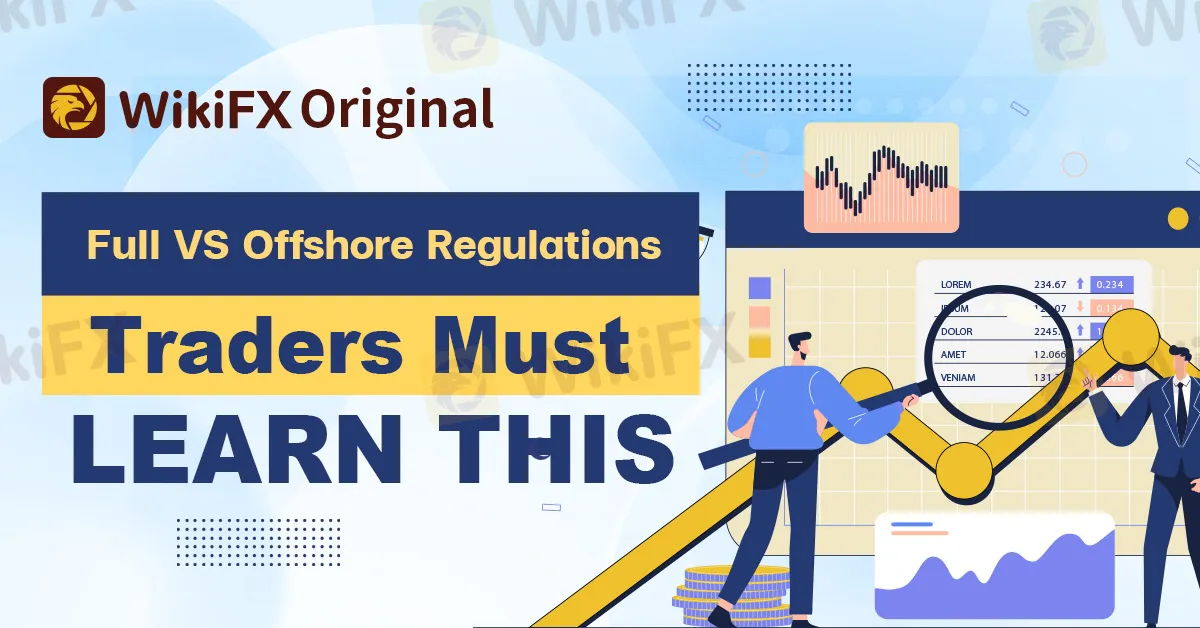简体中文
繁體中文
English
Pусский
日本語
ภาษาไทย
Tiếng Việt
Bahasa Indonesia
Español
हिन्दी
Filippiiniläinen
Français
Deutsch
Português
Türkçe
한국어
العربية
Full VS Offshore Regulations | Traders Must Learn This
Abstract:Discover the differences between full regulation and offshore regulation in the financial sector and learn how WikiFX empowers traders with essential regulatory insights to make informed decisions in the complex financial market landscape.

In the ever-evolving financial sector, understanding the different types of regulations is crucial for traders and investors seeking a safe and reliable trading environment. Regulations can be broadly categorized into two types: full regulation and offshore regulation, each with its own set of advantages and considerations.

When operating under full regulation, financial entities face stricter rules on license issuance and management. This can provide traders with a sense of security, knowing that the regulatory authorities are actively monitoring and supervising the market. Countries like the European Union members, the United Kingdom, the United States, Australia, Hong Kong, Israel, and Russia implement full regulation, making it a prevalent practice in many established financial markets.
However, with the benefits of comprehensive oversight come more extensive requirements and higher costs. Full regulation often involves substantial management fees, including application fees, activation fees, and annual fees. Moreover, entities operating within these jurisdictions are subject to minimum capital requirements to ensure financial stability. The process of obtaining licenses can be intricate, involving extensive due diligence and suitability procedures for companies, directors, and shareholders.

On the other hand, offshore regulation provides an alternative for traders seeking a more flexible and cost-effective approach. Obtaining an offshore license is generally faster, taking only a few months in most cases, depending on the regulatory jurisdiction. The operational costs and management fees tend to be lower, making it an attractive option for those seeking more accessible entry points into the market.
A key advantage of offshore regulation is the relaxed conditions for obtaining licenses. Many offshore regulatory jurisdictions do not require physical presence for office space, company directors, or shareholders. This can significantly reduce the administrative burden and costs associated with establishing a physical presence in a foreign country.
Moreover, offshore regulation often imposes limited reporting requirements, primarily focusing on capital adequacy and financial conditions. This lighter reporting burden allows entities to operate with greater ease and lower compliance costs. In many offshore jurisdictions, there is no requirement for financial services to be provided exclusively to local residents or within the jurisdiction, providing more flexibility for international operations.

As a prominent platform for traders and investors, WikiFX plays a vital role in enhancing the understanding of regulatory environments worldwide. Its comprehensive database offers insights into the regulatory status of brokers and financial entities, enabling traders to make informed decisions.
By using WikiFX, traders can easily identify whether a broker operates under full regulation or offshore regulation. The platform provides detailed profiles of brokers, including licensing information, regulatory statuses, and any reported issues or complaints. This empowers traders to assess the level of oversight and security offered by a particular broker, helping them navigate the complex financial landscape with confidence.
Additionally, WikiFX serves as a valuable resource for understanding the requirements and implications of different regulatory environments. Whether a trader is considering full regulation or exploring opportunities in offshore jurisdictions, WikiFX's platform equips them with the knowledge needed to weigh the pros and cons effectively.
In conclusion, WikiFX's dedication to providing comprehensive and up-to-date regulatory information is an invaluable asset for traders and investors worldwide. By leveraging its platform, traders can make well-informed choices, enhance risk management, and seize opportunities in the ever-changing financial markets.

Disclaimer:
The views in this article only represent the author's personal views, and do not constitute investment advice on this platform. This platform does not guarantee the accuracy, completeness and timeliness of the information in the article, and will not be liable for any loss caused by the use of or reliance on the information in the article.
Read more

Close Up with WikiFX - A Closer Look at Taurex
With the rapid growth of the global multi-asset investment market, the disparities in the forex industry across different regions have become increasingly evident. As a forex broker information service platform operating in over 180 countries and regions, WikiFX is committed to helping investors in each region identify reliable brokers. Therefore, WikiFX launched a new series — Close Up with WikiFX, which offers in-depth interviews with local brokers. Leveraging WikiFXs robust big data system and industry insights, the series aims to help investors gain a deeper understanding of high-quality brokers.

Truth About Markets.com: 5 Hidden Risks Revealed
There are many brokers that offer too many promotions. Have you ever wondered why they do this? This Could be the story of Markets.com. Before you choose Markets.com, read about the hidden risks they never openly talk about.

Breaking News: OmegaPro Caught in a $650 Million Forex and Crypto Investment Scam
An indictment was leveled against two men in the District of Puerto Rico for their alleged involvement in the operation and promotion of OmegaPro, an international investment scheme that has led to financial losses worth over $650 million for investors. Check more about this story

5 Reasons: Microtrade Is a Red Alert
Is MicroTrade a scam or is it safe? This is a common question for many who are looking to invest or trade. Check out this article and you’ll see it is an investment scam
WikiFX Broker
Latest News
Alchemy Markets Review 2025: Key Facts and Insights
Largest Market Makers
Temasek's portfolio scales new peak even as divestments hit over 2-decade high
Exposing Trade Capital Limited - Siphoning Millions, Restricting Withdrawals, Charging Extra Fees
GMI Edge: A Closer Look at Its Licenses
How Do I Place a Stop-loss Order?
5 Serious Warnings About Mirrox! You Can’t Afford to Ignore
FXPRIMUS: 5 Things They Don’t Want You to Know
Manual vs. Automated Forex Trading: Which One Should You Choose?
Mining firms lift FTSE 100 to record high after Trump confirms 50% copper tariff
Currency Calculator


